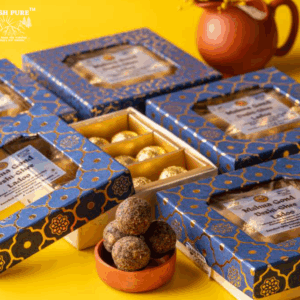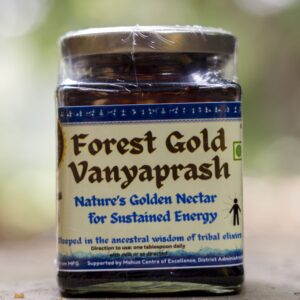A Forgotten Source of Nutrition
Mahua (Madhuca longifolia / Madhuca indica), often remembered only for its sweet blossoms and fermented drinks, hides an extraordinary nutritional profile. Beyond sugars and energy, Mahua flowers are packed with essential minerals and micronutrients that are often missing in staple diets of rural India.
Scientific analysis of dried Mahua blossoms has revealed a unique concentration of calcium, magnesium, iron, and other trace elements that make this forest flower a true nutrient powerhouse. In this article, we explore Mahua’s mineral composition, compare it with common foods, and highlight its potential role in addressing malnutrition and micronutrient deficiencies.
The Mineral Profile of Mahua Blossoms
Concentrated Nutrition in Dried Flowers
Studies using inductively coupled plasma–optical emission spectrometry (ICP-OES) and other methods have established the mineral composition of Mahua blossoms【Ahirwar et al. 2018】【Singh et al. 2020】:
| Nutrient | Concentration (mg per 100 g dry weight)* | Health Role | Comparison with Common Foods |
|---|---|---|---|
| Calcium (Ca) | 131.6 | Bone development, nerve signalling | More than a cup of cow’s milk (120 mg) |
| Magnesium (Mg) | 242.1 | Energy metabolism, muscle & nerve health | Nearly 2× that of spinach (79 mg) |
| Iron (Fe) | 141.2 | Oxygen transport, immunity, haemoglobin | Over 50× more than spinach (2.7 mg) |
| Potassium (K) | 16.7 | Heart rhythm, hydration, electrolyte balance | Lower than banana (358 mg) but significant when combined with other foods |
| Zinc (Zn) | 7.1 | Growth, immune function, wound healing | Comparable to cashews (5.8 mg) |
| Copper (Cu) | 2.0 | Antioxidant defence, iron metabolism | Higher than apple, similar to nuts |
| Manganese (Mn) | 5.3 | Bone formation, enzyme activity | Much higher than rice (1.1 mg) |
| Cobalt (Co) | 0.13 | Component of Vitamin B₁₂ | Rarely present in plant foods |
*Values converted from ppm (mg/kg) to mg/100 g dry weight.
👉 Clearly, Mahua provides dense mineral nutrition in a small serving — especially rich in iron, magnesium, and calcium.
Health Implications of Mahua’s Mineral Richness
1. Combating Anaemia
Iron deficiency remains a major public health challenge in India. With 141.2 mg of iron per 100 g, Mahua provides far more iron than spinach, jaggery, or most cereals. Combined with its natural vitamin C, Mahua significantly enhances iron absorption, making it a potential ally in reducing anaemia.
2. Bone and Joint Health
High calcium (131.6 mg) and magnesium (242.1 mg) levels support bone density, prevent osteoporosis, and improve joint flexibility. Manganese further aids cartilage formation, making Mahua an important food for both growing children and elderly populations.
3. Supporting Immunity and Growth
Zinc, copper, and magnesium are critical for immune function, wound healing, and growth. In regions where zinc deficiency is linked to stunted growth, Mahua blossoms offer a natural supplement.
4. Heart and Muscle Health
Potassium and magnesium regulate heart rhythm, muscle function, and blood pressure. Although potassium levels in Mahua are modest compared to bananas, its combination with magnesium provides synergistic benefits.
Traditional Wisdom Meets Modern Science
For centuries, tribal communities have relied on Mahua to bridge the nutritional gap during lean seasons. Dried flowers stored year-round became a portable mineral reserve.
- Women consumed Mahua preparations during pregnancy and lactation to support bone and blood health.
- Elderly villagers ate Mahua laddoos and porridges for strength and recovery.
Today, organizations such as Jai Jungle Farmers Producer Company in Jashpur are working with tribal women to reimagine Mahua in ready-to-eat forms like porridges, laddoos, and bakery items. These initiatives are not about creating luxury products but about making traditional nutrition more accessible, hygienic, and scientifically validated for wider use.
Micronutrient Deficiencies in India – Where Mahua Fits In
- Iron deficiency anaemia affects 57% of women in India (NFHS-5). Mahua’s iron and vitamin C combination directly addresses this.
- Calcium deficiency is widespread due to low dairy intake in tribal areas. Mahua can complement local diets.
- Magnesium intake in India is below recommended levels. Mahua offers an abundant, plant-based source.
By integrating Mahua into public nutrition strategies and community diets, we could make significant strides against malnutrition.
The Challenge – From Forest to Plate
Despite its richness, Mahua’s potential is limited by:
- Stigma: Associated with liquor rather than nutrition.
- Collection methods: Poor handling leads to contamination, reducing food-grade quality.
- Policy gaps: Unlike millets, Mahua has no MSP or inclusion in mid-day meal schemes.
To harness its micronutrient power, Mahua must be positioned as a superfood for public health — through awareness, clean collection nets, and value-added products that preserve its nutritional benefits.
Micronutrient Treasure in the Forest
Mahua blossoms are not just seasonal forest produce; they are a micronutrient treasure chest. With calcium higher than milk, iron far richer than spinach, and magnesium nearly double common greens, Mahua deserves recognition as a functional food in India’s nutrition strategy.
Protecting Mahua trees, ensuring hygienic collection, and innovating ready-to-eat Mahua-based foods could transform this forgotten flower into a weapon against hidden hunger and micronutrient deficiencies.
References
- Ahirwar, R.K. et al. (2018). Nutritional composition of Mahua flower. JETIR1801080.
- Singh, V. et al. (2020). Assessment of antioxidant activity, minerals and chemical constituents of edible Mahua flower and fruit. Nutrition & Food Science.
- Das, S.K. (2019). Mahua: A boon for pharmacy and food industry. IJCS.
- Parmar, R. (2020). Development of Mahua flower enriched wheat-based laddoo. Biological Forum.
- Health Benefits Times. Mahua (Butter nut tree) benefits and uses.
Handpicked for You
-
Mahua Heritage Collection
Mahua Nectar Gold
Rated 0 out of 5₹699.00Original price was: ₹699.00.₹655.00Current price is: ₹655.00. INR Add to cart -
Wholesome Bakes
Buckwheat Jaggery Mahua Cookies
Rated 0 out of 5₹175.00Original price was: ₹175.00.₹170.00Current price is: ₹170.00. INR Add to cart -
Forest Sweets & Treats
Desi Ghee Mahua Gond Laddoos
Rated 0 out of 5₹350.00Original price was: ₹350.00.₹340.00Current price is: ₹340.00. INR Select options This product has multiple variants. The options may be chosen on the product page -
Mahua Heritage Collection
Forest Gold Vanyaprash – Pure Mahua Wellness Paste
Rated 0 out of 5₹575.00Original price was: ₹575.00.₹550.00Current price is: ₹550.00. INR Add to cart
